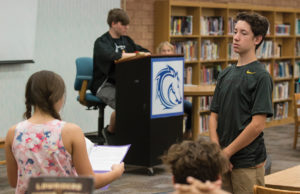
Students in Larry Johnson’s class at Shepherd Junior High school take part in a Teen Court practice, Thursday, Oct. 19, 2017. [Photo by Tim Hacker/ Mesa Public Schools]
As attorneys analyze details for prosecution and defense of the respondent, the judge provides instructions to jurors. The twist? All participants are eighth-grade students in Larry Johnson’s gifted American Studies class at Shepherd Junior High School.
Mr. Johnson’s students are participating in Teen Court, the Maricopa County diversion program. Teen Court participants determine sentences for eligible Maricopa County teens who are first-time offenders and have admitted responsibility for low-level misdemeanor crimes.
Students prepare for trial
Today, the media center becomes a courtroom. Mr. Johnson’s students hone their skills in a final dress rehearsal to prepare for a real case. Students spend months training to participate in Teen Court hearings by learning about the judicial system, studying cases, portraying all roles and gathering sufficient information to assign consequences.
Mr. Johnson coaches his students, reminding them to speak loudly and enunciate their words.
“Remember to slow down, and don’t be nervous,” the teacher said addressing his class. “The defendant and jury members need to hear you, or we aren’t doing our jobs.”
Reinforcing good citizenship
For more than 19 years, Mr. Johnson has worked with the Maricopa Juvenile Probation Office to provide his students with this powerful educational experience. Teen Court is an alternative to institutional sentences for young offenders at risk. The program helps reduce juvenile crime within the community through peer influence. Students learn about the legal system, develop public speaking skills and help right the wrongs defendants commit.
“It’s interesting to learn that people my age commit crimes,” said student Ariel Fendenheim. “It’s serious, and we are learning how to understand a problem from both sides to address it.”
Sentences include community service, writing essays and public apologies. According to Mr. Johnson, Teen Court is successful because teens are more likely to ask and answer the tough questions about why a crime was committed.
“It’s a humbling experience to be judged by your peers,” Mr. Johnson said. “The experience is life-changing. Once sanctions are completed, their criminal record is wiped clean. This is important when teens apply to college or for a job.”
Students are more engaged in learning and retain information longer when they can apply it to real-life situations. Teen Court participants receive service hours and the satisfaction of helping other teens turn their behaviors around.
“Knowing that our cases involve real people makes it interesting,” said student David Gagon. “Determining an appropriate punishment teaches us about the consequences for breaking the law.”
For more information about all Mesa Public Schools, please visit mpsaz.org.

